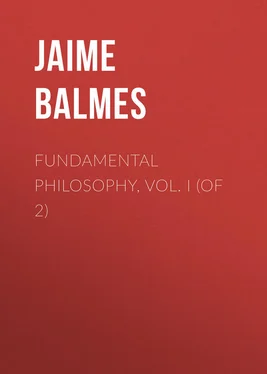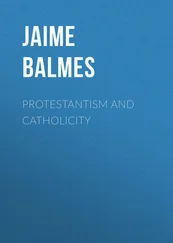Jaime Balmes - Fundamental Philosophy, Vol. I (of 2)
Здесь есть возможность читать онлайн «Jaime Balmes - Fundamental Philosophy, Vol. I (of 2)» — ознакомительный отрывок электронной книги совершенно бесплатно, а после прочтения отрывка купить полную версию. В некоторых случаях можно слушать аудио, скачать через торрент в формате fb2 и присутствует краткое содержание. Жанр: foreign_antique, foreign_prose, на английском языке. Описание произведения, (предисловие) а так же отзывы посетителей доступны на портале библиотеки ЛибКат.
- Название:Fundamental Philosophy, Vol. I (of 2)
- Автор:
- Жанр:
- Год:неизвестен
- ISBN:нет данных
- Рейтинг книги:3 / 5. Голосов: 1
-
Избранное:Добавить в избранное
- Отзывы:
-
Ваша оценка:
- 60
- 1
- 2
- 3
- 4
- 5
Fundamental Philosophy, Vol. I (of 2): краткое содержание, описание и аннотация
Предлагаем к чтению аннотацию, описание, краткое содержание или предисловие (зависит от того, что написал сам автор книги «Fundamental Philosophy, Vol. I (of 2)»). Если вы не нашли необходимую информацию о книге — напишите в комментариях, мы постараемся отыскать её.
Fundamental Philosophy, Vol. I (of 2) — читать онлайн ознакомительный отрывок
Ниже представлен текст книги, разбитый по страницам. Система сохранения места последней прочитанной страницы, позволяет с удобством читать онлайн бесплатно книгу «Fundamental Philosophy, Vol. I (of 2)», без необходимости каждый раз заново искать на чём Вы остановились. Поставьте закладку, и сможете в любой момент перейти на страницу, на которой закончили чтение.
Интервал:
Закладка:
171. Descartes did nothing more in this point than what all philosophers do; and strange as it may seem, he did not differ from the chiefs of the metaphysical school diametrically opposed to his own, that of Locke and Condillac. That man, in seeking to examine the origin of his cognitions, and the principles on which his certainty is based, encounters the fact of consciousness of his internal acts, that this consciousness produces a firm certainty, and that we can conceive nothing more certain, is a fact on which all ideologists agree, and which all establish, although not in the same words. The more we reflect on these matters, the more we discover in them the realization of a principle confirmed by reason and experience, that many truths are not new, but only presented under a new form, and that many systems are not new, but only expressed in new formulas.
172. Even the universal doubt of Descartes, rightly understood, is practised by every philosopher; whence we see that the basis of his system, opposed by many, is in fact adopted by all. In what does his method consist? It may all be reduced to these two points: I. I wish to doubt of everything: II. When I wish to doubt of myself, I cannot.
Let us examine these points, and we shall see that they are common to all philosophers with Descartes.
Why does Descartes wish to doubt of everything? Because he proposes to examine the origin and certainty of his cognitions, his whole knowledge; and therefore he cannot help supposing nothing to be true. If then he supposes anything, he does not examine the origin and motives of the certainty of everything, since he excepts that which he supposes to be true. He must suppose nothing to be true, that he knows nothing of anything; otherwise he cannot say that he examines the foundation of everything. Either there is no such philosophical question, although one is found in all books of philosophy, or else Descartes' method must of necessity be followed.
But in what does this doubt consist? Can it, rationally speaking, be a real and true doubt? No! that is absolutely impossible. Man does not, because a philosopher, destroy his nature; and nature is invincibly opposed to this doubt taken in a strict sense.
173. What then is this doubt? Nothing more than a supposition , a fiction ; a supposition and fiction such as we make at every step in all science, and which, in reality, is only non-attention to a conviction of our own. Use is made of this doubt in order to discover the first truth on which our understanding rests; and this only requires a fictitious doubt: there is no necessity of its being positive, for it will evidently make no difference whether we really doubt of everything, admit absolutely nothing, or say: I suppose that I have nothing for certain, know nothing, admit nothing. An example will make this explanation more evident. Whoever knows the rudiments of geometry, knows that in a triangle, the greater angle is opposite to the greater side, and he is absolutely certain of the truth of this theorem; but if he propose to demonstrate it to another, or repeat the demonstration to himself, he abstracts the said certainty, and proceeds as though he had it not, in order to show that it is founded upon something.
In all our studies, at every step, we do the same. Such expressions as these are common: "This is so, it is evident; but let us suppose that it is not; what will be the result?" "This demonstration is conclusive, but let us set it aside and suppose that we have it not; how shall we demonstrate what we desire?" Arguments ad absurdum , so much in use in every science, more especially in mathematics, consist not only in abstracting what we know, but in supposing something directly contrary. "If the line A," says continually the geometrician, "is not equal to B, it is either greater or less: let us suppose it to be greater, etc." Thus to investigate truth, we frequently abstract what we know, and even suppose the contrary. Apply this system to the investigation of the fundamental principle of our cognitions, and Descartes' universal doubt will follow, in the only sense admissible at the tribunal of reason, and possible to human nature.
It is probable that the illustrious philosopher understood it in the same sense, although we must confess that his words are ambiguous. We cannot conceive what object he could have had in understanding it differently, supposing, as we do, that he had no other purpose than to pave the way for the investigation of truth. By his manner of expressing himself, he gave occasion to disputes, which greater clearness would have prevented.
As he did not express himself with sufficient clearness, so his adversaries did not press him with all the precision and energy possible. To settle this whole matter, it would have sufficed to ask him this question: Do you mean to say that, in commencing our philosophical investigations, there is a moment in which we really and actually doubt of every thing; or do you deem it sufficient to abstract certainty, and to suppose that we have it not, as is frequently done in other studies?
174. Descartes was like all reformers who are ruled by one idea, and express it so strongly as to seem to admit no other beside it. In their language every thing is absolute, exclusive. They anticipate the combat which they must sustain, perhaps already experience it, and so they concentrate all their strength on the idea whose triumph they propose, and lose sight of every thing else. It cannot be inferred from this that they have no others which notably modify the principal; but to oppose their adversaries, who say, "This is absolutely false," they assert that it is absolutely true. History and experience furnish innumerable examples of such exaggerations.
The dominant idea of Descartes was to demolish the philosophy which at that time reigned in the schools; and he gave it so rude a shock as to make the world tremble. See how he expressed his contempt for many called philosophers: "Experience shows that they who make profession of being philosophers are often less wise and less reasonable than they who never applied themselves to this study." 11 11 Les Principes de la Philosophie. Preface, p. 13.
175. The second part of Descartes' method consists in taking thought for the point of departure, and in declaring that in trying to doubt of every thing man finds a limit in the consciousness of his thought, his existence. This is evidently the phenomenon which remains in the mind of the observer after doubting of every thing else; at least he cannot doubt that he doubts, and consequently that he thinks; for it must be remarked that this is an argument which has always been used against skeptics, which is equivalent to Descartes' method, and establishes as an undeniable phenomenon a certainty superior to all sophisms, the consciousness of one's self.
When Descartes said, I think , he meant by this word every internal act, every phenomenon immediately present to the soul; he spoke not of thought taken in a purely intellectual sense, but included in it all that of which we have immediate consciousness. "By the word thought ," he says, "I understand all that is done within us, in such a manner that we perceive it immediately by ourselves: this is why not only to understand, to will, to imagine, but also to feel, are here the same thing as to think. For if I say that I see, or that I walk, and thence I infer that I am; if I mean to speak of the action performed with my eyes or with my feet, this conclusion is not so infallible that I have no reason to doubt it; because it may be that I think I see, or walk, although I do not open my eyes or stir from my seat; for this sometimes happens when I am asleep, and the same might also happen even if I had no body; but if I mean to speak only of the action of my thought or of the feeling, that is to say, the knowledge that I possess, which makes it seem to me that I see, or that I walk, this same conclusion is so absolutely true that I cannot doubt it; because it relates to the soul, which alone has the faculty of feeling, or of thinking, in any other manner whatever." 12 12 Les Principes de la Philosophie. 1ière. partie, N. 9.
Интервал:
Закладка:
Похожие книги на «Fundamental Philosophy, Vol. I (of 2)»
Представляем Вашему вниманию похожие книги на «Fundamental Philosophy, Vol. I (of 2)» списком для выбора. Мы отобрали схожую по названию и смыслу литературу в надежде предоставить читателям больше вариантов отыскать новые, интересные, ещё непрочитанные произведения.
Обсуждение, отзывы о книге «Fundamental Philosophy, Vol. I (of 2)» и просто собственные мнения читателей. Оставьте ваши комментарии, напишите, что Вы думаете о произведении, его смысле или главных героях. Укажите что конкретно понравилось, а что нет, и почему Вы так считаете.












